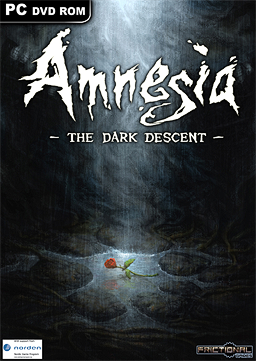Amnesia: The Dark Descent – 0/1 – Henry Arrambide
This cover is deceptively intriguing.
Amnesia: The Dark Descent is, in the most literal sense, a fool’s game. In order for the player to be drawn into the haunting atmosphere of the game’s abandoned castle, a great deal of intelligence must be sacrificed. While most horror games do this effectively by creating a sense of tension and self-doubt within the player that undermines the player’s trust in their own intelligence, Amnesia robs the player of an element of choice which allows that kind of tension to form organically.
Choice creates tension. As part of its character, one of the elements of Amnesia’s design is that the player has no weapon. While this may make someone in the protagonist’s situation terrified in the real world, in Amnesia it limits player choice. When a monster appears, the player knows he must run and hide.
Amnesia’s levels come in two flavors: Y shaped and O shaped. Y shaped layouts essentially are straight hallways with minor detours to the left or right, but it is always apparent what the main path and direction are. O shaped layouts are halls that go in circles with little paths that tend to point in the four cardinal directions. In both instances the ‘puzzles’ for each segment of the game are very straightforward: collect the glowing objects on the minor paths and use them to open the exit that lays on the major path.
At least the environments are pretty.
This combination of formulaic layouts and single-answer solutions to the semi-random monster appearances (SEMI-random. In the second half of the game it gets tediously predictable that whenever you solve a puzzle there’s going to be some loud bangs and a monster spawned somewhere on the map) makes for a dull game. Perhaps I am meta-gaming too much, but once these patterns become apparent you cannot un-see them. The atmosphere breaks.
In lieu of tension or doubt forming within a player due to their choices affecting the world of the game, what Amnesia leaves players with is a simulation of a decent Halloween ride. Once the player gets into the groove of the game, instances of doors slamming and windows banging becoming annoying hindrances that slow down the exploration of the beautiful environments. Monsters popping out at the player aren’t frightening due to the linearity and predictability of the puzzles and maps – rather than being frightened or surprised or puzzled about what to do, you know to just run.
Better yet, if you just stand there and die, there are no repercussions for the player. There is no sense of loss in death because there is no loss. You respawn on the map with all key items and in a most cases a safe place. In a game where I should fear for my character’s life, death should not be rewarding.
You literally will be in a better place if you just let it kill you.
Speaking of character, while Daniel (the protagonist) has an interesting story, in no way does it connect with me as a player. His story is interesting and tragic, yet aside from reading about it in notes and some short flashbacks near the end, there is nothing I as a player connect with. The Daniel you control in game is not the Daniel you read about in game.
The Daniel you play as cowers when safely seated in a dark room despite no monsters being on the map, he loses his wits when a door slams shut, he requires a night-light to not kill himself. This translates into a hard to control stuttering character with bad vision that freaks out at situations the player doesn’t consider scary. The player knows the map is clear, the player knows they need to preserve tinderboxes and oil, the player knows they are safe. Daniel is flipping out and suicidal. The player grows irate with Daniel. This is the person the player is supposed to sympathize with.
Beyond Daniel’s character, the larger story of Amnesia is a vague semi-Lovecraftian ride concerning magic orbs and an ambiguously evil entity called ‘The Shadow’ which is chasing after Daniel. These concepts are played loose and I suppose explain away why there’s monsters and creepy things influencing the castle and creating obstacles on the journey. Aside from that there’s a few secondary characters who in the end become key to beating the game with the best ending. I must say the voice acting is quite great.
Sam A. Mowry as Alexander did some pretty sweet voice acting.
The story, while cohesive, is not very extensive or involving, secondary to the atmosphere of the game. The atmosphere is not necessarily terrifying and in a lot of instances is broken by the game’s lack of tension (and extended, the game’s lack of choice), but the environments are pretty. Puzzles aren’t intense exercises in thought but there are two or three gems in the bunch, mostly involving mutilating bodies and performing alchemy. While a pretty product, Amnesia: The Dark Descent is a forgettable experience.





No comments:
Post a Comment